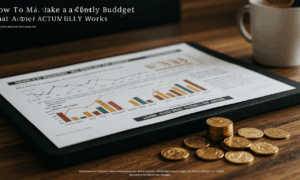Zero-Based Budgeting: The Radical Method to Take Absolute Control of Your Finances
Are you ever left wondering where your money went just a few days after payday? It is a common feeling: your income arrives, you pay your bills, and somehow, the rest seems to vanish into thin air. If you are tired of this cycle and ready to gain true mastery over your financial life, then Zero-Based Budgeting is the powerful, proactive system you need. This method goes beyond simple expense tracking; it transforms you into the chief financial officer of your own life, ensuring every single dollar has a clear purpose. This article will guide you through what Zero-Based Budgeting is, how to implement it step-by-step, and how it can permanently change your relationship with money.
This is not just another budgeting tip; it is a fundamental shift in mindset. Instead of looking at last month’s spending to decide this month’s, you start from zero, building a new plan for your money each and every month. It is about being intentional, not reactive.
What Exactly Is Zero-Based Budgeting?
At its core, Zero-Based Budgeting (ZBB) is a method where your income minus your expenses equals zero. This does not mean you should aim to have no money left in your account. On the contrary, it means that every single unit of currency you earn is assigned a specific job before the month begins. These jobs can be paying for housing, buying groceries, adding to your savings, paying off debt, or funding your investment portfolio.
Traditional budgeting often involves taking last month’s budget and making small adjustments. For example, if you spent 300 on groceries last month, you might budget 300 again. ZBB forces you to question that 300. Do you really need to spend that much? Could some of it be better used elsewhere, like an extra payment on a loan or a contribution to your retirement fund? With ZBB, every expense must be justified, every single month. It is a clean-slate approach that promotes conscious spending and eliminates financial autopilot.
The Core Principle: Giving Every Dollar a Job
The entire philosophy of ZBB is captured in one simple formula: Income – Expenses = 0. Let us break this down. Your income is all the money you expect to receive in a month. Your expenses are not just your bills; this category includes everything you do with your money. This is a crucial distinction. In a zero-based budget, expenses are divided into three main areas:
- Spending: This includes all your fixed costs like rent or a mortgage, variable costs like utilities and food, and discretionary spending like entertainment or dining out.
- Saving: Allocations for your emergency fund, a down payment on a house, or a vacation fund are treated as expenses. You are “paying” your future self.
- Investing: Contributions to retirement accounts or other investment vehicles are also planned expenses. You must purposefully allocate money to your investment goals.
When your income is fully allocated across these categories and the result is zero, you have successfully created a zero-based budget. You have built a deliberate plan for your money, leaving nothing to chance. This proactive stance is the key to building wealth and achieving financial stability.

How to Create Your First Zero-Based Budget: A Step-by-Step Guide
Getting started with ZBB requires some initial effort, but the clarity it provides is well worth it. Follow these steps to build your first budget and take command of your finances.
- Calculate Your Total Monthly Income: Start by listing all your sources of income for the month. This includes your primary salary after taxes, any freelance work, side hustle earnings, or any other money you expect to receive. If your income is variable, it is often best to budget based on your lowest-earning month to ensure you can cover all necessities. Any extra income can then be allocated to savings or debt repayment.
- List All Your Anticipated Expenses: This is the most detailed step. Go through your bank and credit card statements from the past few months to identify all your spending. Group them into categories. Be as specific as possible. Common categories include: rent/mortgage, utilities, groceries, transportation, insurance, phone bill, debt payments, personal care, entertainment, savings contributions, and investments. Do not forget non-monthly expenses like annual subscriptions or car maintenance; divide their annual cost by 12 and set that amount aside each month.
- Allocate Your Income and Balance Your Budget: Now, assign a specific dollar amount to each expense category. Start with your essential needs (the “four walls”): food, utilities, shelter, and transportation. Then, move on to other important obligations like debt payments and savings goals. Finally, allocate the remaining funds to discretionary categories. Adjust the numbers in each category until your total allocated expenses equal your total income. This is the balancing act that lies at the heart of ZBB.
- Track Your Spending Meticulously: A budget is useless if you do not follow it. Throughout the month, you must track every single expense and assign it to its designated category. You can use a dedicated budgeting app, a spreadsheet, or a simple notebook. This daily habit is what makes the system work, as it keeps you accountable to the plan you created.
- Review and Create a New Budget Each Month: A zero-based budget is a living document. Your expenses and income can change from month to month. At the end of each month, review your spending. Did you overspend in some areas and underspend in others? Use this information to create a new, more accurate budget for the next month. This continuous cycle of planning, tracking, and adjusting is what builds financial discipline and success.
The Transformative Benefits of Zero-Based Budgeting
Adopting this method can have a profound impact on your financial well-being. The benefits go far beyond just knowing where your money goes.
- Complete Financial Clarity: You will develop an unparalleled awareness of your financial habits. There will be no more “mystery” spending, as every dollar is accounted for.
- Curtails Wasteful Spending: By forcing you to justify every expense each month, ZBB naturally highlights spending that does not align with your values or goals. This makes it easier to cut back on things that are not providing real value.
- Accelerates Progress Toward Financial Goals: Saving and investing are no longer afterthoughts. They become fixed-line items in your budget, just as important as your rent. This intentional allocation ensures you consistently work toward your major financial objectives.
- Provides Agility and Control: Life is unpredictable. Because you create a new budget every month, you can quickly adapt to changes like a pay cut, a bonus, or an unexpected expense. This flexibility gives you a sense of control, even when facing uncertainty.
Conclusion: From Financial Chaos to Intentional Control
Zero-Based Budgeting is more than just a technique; it is a philosophy of intentionality. It is about making conscious decisions that align your daily spending with your long-term aspirations. While it requires more upfront effort than traditional budgeting, the rewards—absolute clarity, reduced financial stress, and faster progress toward your goals—are immeasurable. It puts you firmly in the driver’s seat of your financial journey.
Take the challenge. Try creating a zero-based budget for just one month. The insights you will gain into your own habits and the sense of empowerment you will feel are the first steps toward building a secure and prosperous financial future. It is a radical method, but it delivers radical results.
Frequently Asked Questions (FAQ)
Is Zero-Based Budgeting suitable for someone with a variable income?
Yes, absolutely. For those with irregular income, the best practice is to build your monthly budget based on your lowest anticipated income. This ensures your essential expenses are always covered. When you have a higher-income month, you can create a priority list for the extra money, such as putting it toward debt, boosting savings, or topping up your investment accounts. This turns unpredictability into an opportunity.
How is this different from just tracking my expenses?
Expense tracking is a reactive process; you look back at what you have already spent. Zero-Based Budgeting is a proactive process; you create a plan for your money before you spend it. Tracking tells you where your money went, while ZBB tells your money where to go. This forward-looking approach is what gives you control.
Do I need special software for Zero-Based Budgeting?
No, you do not need any fancy tools to start. A simple spreadsheet, a notebook and a pen, or even a system of cash envelopes can work perfectly well. The most important thing is the methodology, not the tool. While many apps are designed for ZBB and can simplify the process, it is best to start with a simple system to learn the principles first.





